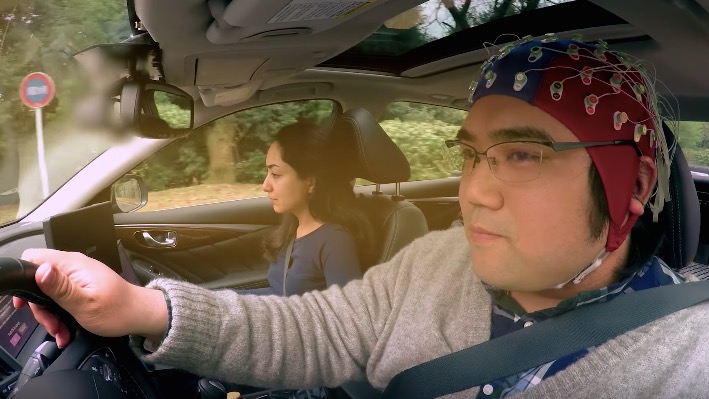Nissan wants to read your brain waves in order to help prevent auto accidents

While everyone else is focusing on innovations such as self-driving and electrical cars, Nissan is over here trying to get us to partially drive cars with our minds. At this point, it's hard to tell which sounds more "futuristic."
Nissan's new "brain-to-vehicle" (B2V) technology, which will be shown in a driving simulator at next week's CES 2018, is aimed at helping us respond to dangerous situations on the road more quickly. As impressive as the human brain is, it still takes a while for us to respond to something that we see in front of us, such as another driver slamming on his or her brakes just a few yards ahead.
With the help of an electroencephalography (EEG) headset, though, Nissan hopes to allow us to respond to these situations by as much as 0.2 to 0.5 seconds faster by predicting our next actions, such as hitting the brakes or turning. The basic idea is that the car would adapt to your brain and help you perform the action sooner than you would have done so yourself.
A half a second may not sound like a lot of time, but in many situations it might be enough to save lives.
Nor is the technology solely applicable to human-driven cars. If you're being ferried around in an autonomous vehicle, Nissan says, the sensors will allow the car to detect any discomfort and adjust its driving style to create a more pleasant riding experience.
From there it gets a little stranger, as Nissan also claims the technology could employ "augmented reality to adjust what the driver sees and create a more relaxing environment." Nissan didn't elaborate on what this means, but spoke of it in the context of the vehicle's "internal environment."
"When most people think about autonomous driving, they have a very impersonal vision of the future, where humans relinquish control to the machines," said Nissan executive vice president Daniele Schillaci in a prepared statement. "Yet B2V technology does the opposite, by using signals from their own brain to make the drive even more exciting and enjoyable."
Sign up for breaking news, reviews, opinion, top tech deals, and more.
Something to think about
EEG experiments often pop up in discussions of current technology, and they've become advanced enough that now it's apparently possible for someone to figure out what your password is just by studying your brain activity. (Prior to that, researchers were looking for a way to entirely replace passwords with brain waves.)
Alongside such discoveries, Nissan's work doesn't seem too out of the ordinary. Even so, it'll be interesting to see how it holds up, considering that we often change our minds about the "right" maneuver to take a split second later after encountering danger.
For that matter, all manner of distractions or random thoughts could interfere, and, of course, you'll have to convince people to drive around wearing some form of headset. It's hard enough to get them to wear seat belts.